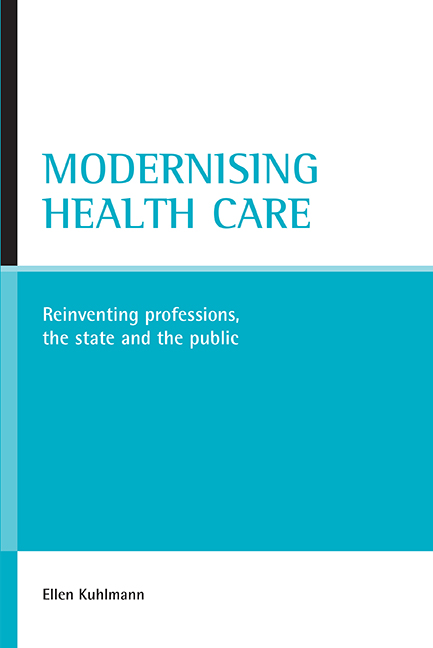Book contents
- Frontmatter
- Contents
- List of tables and figures
- Acknowledgements
- Abbreviations
- Glossary
- Introduction
- one Towards ‘citizen professionals’: contextualising professions and the state
- Part I Mapping change in comparative perspective
- Part II Dynamics of new governance in the German health system
- Part III The rise of a new professionalism in late modernity
- References
- Appendix: Research design of the empirical in-depth study
- Index
- Also available from The Policy Press
six - Transformations of professionalism: permeable boundaries in a contested terrain
Published online by Cambridge University Press: 15 January 2022
- Frontmatter
- Contents
- List of tables and figures
- Acknowledgements
- Abbreviations
- Glossary
- Introduction
- one Towards ‘citizen professionals’: contextualising professions and the state
- Part I Mapping change in comparative perspective
- Part II Dynamics of new governance in the German health system
- Part III The rise of a new professionalism in late modernity
- References
- Appendix: Research design of the empirical in-depth study
- Index
- Also available from The Policy Press
Summary
Professionalism is increasingly applied to the entire field of health occupations and falling into a more flexible and contextualised regulatory order pattern, which different actors can make use of in various ways. This chapter will explore the varieties of and opportunities for a more inclusive professionalism. I will assess changes in three occupational groups that act from very different positions in the health care system and set the dynamics against new demands on health care and citizenship. The findings highlight the flexibility and power of professionalism to transform itself. Physicians develop new strategies that link professionalisation to elements of new governance; physiotherapists expand marketisation, improve academic training and bypass the control of physicians; surgery receptionists refer to professionalism, despite a lack of resources and a gender identity that clashes head on with professionalisation. An increasing diversity provides new opportunities for the softening of professional boundaries. However, interprofessional dynamics remain weak and medical power strong, as the state fails to set up structures that better coordinate the entire workforce. The options of an emerging inclusive professionalism do not, therefore, translate easily into a collaborative health workforce and ‘citizen professionals’ that better serve public demands on health care.
Medical profession: linking professionalism and new governance
Medical practice is challenged by the logics of marketisation and managerialism, and by claims for accountability and the participation of new actors in health care. These challenges are under the spotlight of public discourse and research on the medical profession. However, pressure ‘from outside’ is only one side of the coin, and this perspective nurtures the assumption that professionalism is threatened by new health policies. In reality, we find new demands ‘from within’ the profession. We have learned from the results of the survey that physicians claim more active participation in professional self-regulation and are searching for new forms of cooperation.
It is precisely this perspective that underlines the fact that professions are part of changing modes of citizenship as a super structure of modernisation (Chapter One, this volume). Accordingly, transformations of professionalism must be assessed as reflexive processes (Giddens et al, 1994) provoked on different levels and nurtured by different and even contradictory interests. Developments can be explained in terms of changing interest-based strategies of the medical profession related to changing health policies and new demands on health care. Three dimensions of transformation will be assessed: marketisation, managerialism and networking.
- Type
- Chapter
- Information
- Modernising Health CareReinventing Professions, the State and the Public, pp. 123 - 154Publisher: Bristol University PressPrint publication year: 2006



